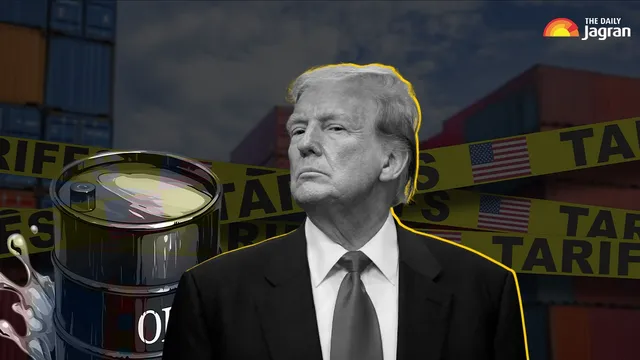- By Supratik Das
- Sat, 16 Aug 2025 01:19 PM (IST)
- Source:JND
US President Donald Trump has hinted that he may not impose additional secondary tariffs on countries purchasing Russian crude oil, including India, easing concerns after his high-stakes meeting with Russian President Vladimir Putin in Alaska on Friday. The development comes amid escalating trade tensions between Washington and New Delhi following Trump’s earlier decision to slap a steep 50 per cent tariff on Indian goods over Russian oil imports. India has already rejected the move, calling it “unfair, unjust, and unreasonable.”
After nearly three hours of talks with Putin in Alaska, Trump was asked again about the secondary tariffs on countries importing oil from Russia. “India doesn’t buy your oil. The European Union won’t buy it. And why in the back of my head was I thinking, wait a minute, Donald Trump just delayed possible a possible increase in tariffs on China? Why do I think that probably President Trump was thinking ahead that maybe if you had to, that would have been part of the consequences?" asked Fox News host Sean Hannity. Trump replied by saying, “Well, because of what happened today, I think I don’t have to think about that now. I may have to think about it in two weeks or three weeks or something, but we don’t have to think about that right now. I think you know, the meeting went very well."
Speaking aboard Air Force One on his way to Alaska, Trump told Fox News that Russia had “lost an oil client” in India after his earlier punitive measures. He suggested that he might not have to impose additional secondary tariffs, though he kept the door open for future action. “Well, he lost an oil client, so to speak, which is India, which was doing about 40 per cent of the oil. China, as you know, is doing a lot…And if I did what’s called a secondary sanction, or a secondary tariff, it would be very devastating from their standpoint. If I have to do it, I’ll do it. Maybe I won’t have to do it," Trump said on Friday.
Breaking: Trump refuses to place tariffs on China for buying Russian energy despite tariffing India for the same reason
— Shashank Mattoo (@MattooShashank) August 16, 2025
“I don’t have to think about that right now. I may have to think about it in 2-3 weeks. But the meeting with Putin went well,” says Trump on China tariffs pic.twitter.com/cEumaWjhmj
India Calls Tariffs “Unreasonable”
The Ministry of External Affairs (MEA) hit back at the US measures, arguing that several countries, including European allies, continue to import Russian crude. MEA spokesperson Randhir Jaiswal said, “It is highly unfortunate that the US decided to go for additional tariffs against India for actions being taken by several other countries too. India will do whatever is necessary to safeguard its national interest.” Prime Minister Narendra Modi also took a firm stand while addressing on Independence Day, vowing that New Delhi would not compromise on the interests of farmers, fishermen, and small industries impacted by the tariffs. “The farmer’s interest is our first priority. India will never compromise. I am prepared to pay the price personally, but India is prepared to protect its people,” Modi said.
Trump’s tariff strategy has triggered a political storm in Washington. The Democratic-led US House Foreign Affairs Committee criticised the decision, saying that penalising India would not deter Putin from continuing the war in Ukraine. “Tariffing India won’t stop Putin. If Trump really wanted to address Russia’s illegal invasion of Ukraine, maybe punish Putin and give Ukraine the military aid it needs. Everything else is smoke and mirrors,” the Committee posted on X.
Tariff Dispute Hits Key Indian Exports
The new 50 per cent tariffs on Indian goods, formalised under Trump’s executive order dated August 6, effectively double duties on sectors such as textiles, fisheries, and marine products. The move could severely impact exporters and disrupt bilateral trade worth billions of dollars. Despite the friction, India continues to stress that its energy policy is guided by affordability, security, and long-term strategic needs. MEA Officials have repeatedly underlined that Russian oil remains a crucial component of India’s energy sector, especially at a time of global supply uncertainties.
While Trump’s softer tone has provided temporary relief, the secondary tariffs may return as a bargaining tool in US-Russia talks. For India, the path forward may involve a delicate balance between protecting its energy interests and navigating geopolitical pressures from Washington.

